On the afternoon of November 9, 2020, the School of International Governance Innovation (SIGI) and the United Nations Office on Drugs and Crime (UNODC) jointly held an online meeting to discuss the collaboration for a translation program of “Education for Justice” (E4J) project. The meeting was chaired by Bianca Kopp, the Focal Point for tertiary education Module of E4J, and Maria Ehalt, Associate Expert in UNODC, and attended by some students from all three grades of SIGI.
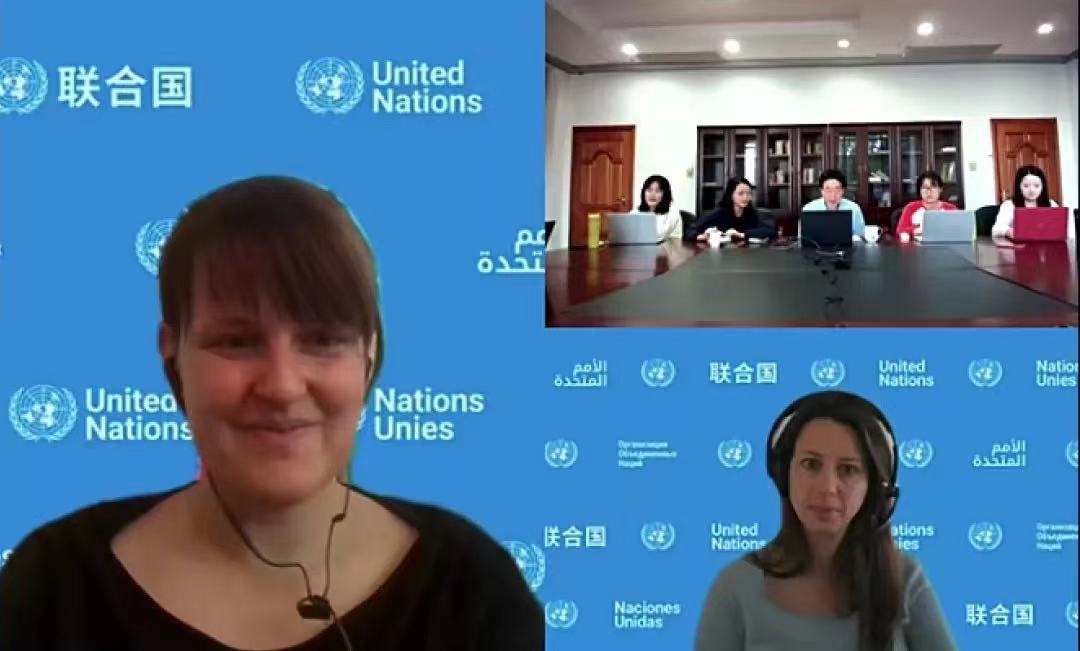
At the start of the meeting, Ms. Kopp first introduced the goals and background of both UNODC and the E4J project.
UNODC and E4J
UNODC, established in 1997 through the merger of the United Nations Drug Control Programme and the Centre for International Crime Prevention, is headquartered at the Vienna International Centre. It operates worldwide through its extensive field office network, aiming to assist its members in combating illicit drugs, crime, and terrorism.
The E4J project is a new initiative carried out by UNODC. It seeks to prevent crime and promote a culture of lawfulness through education activities designed for primary, secondary, and tertiary levels. These activities help educators teach the next generation to better understand and address problems that can undermine the rule of law and encourage students to actively engage in their communities and future professions in this regard. A set of products and activities for the primary and secondary levels has been developed in partnership with UNESCO.
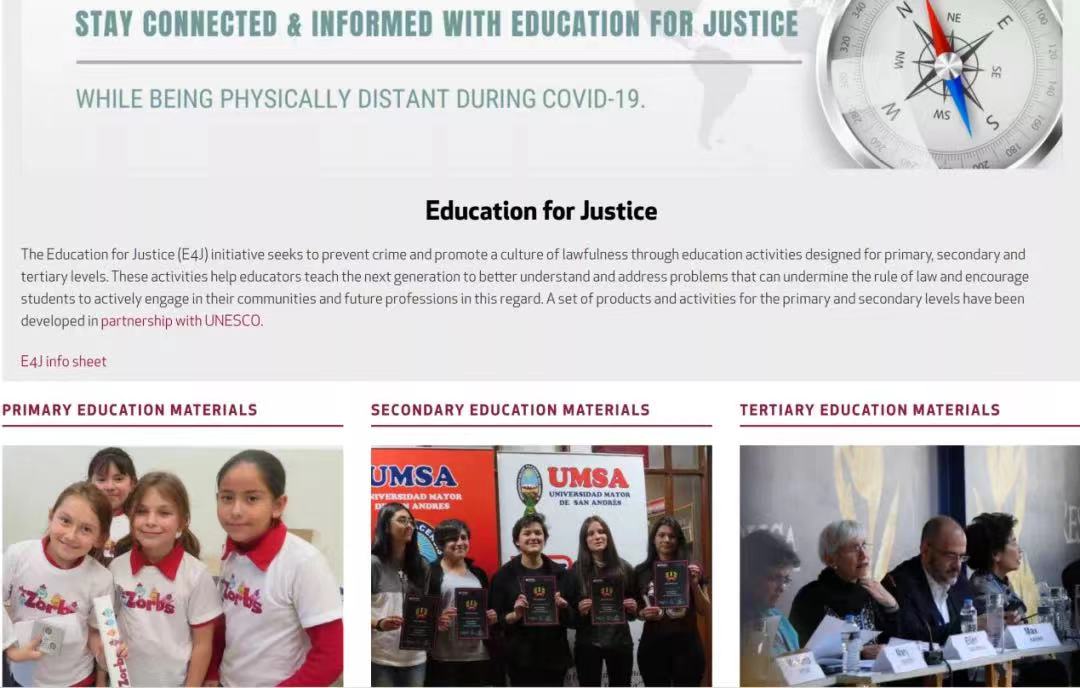
The E4J project is closely related to the United Nations Sustainable Development Goals (SDGs), particularly SDG 16 and SDG 4. SDG 16 aims to promote peaceful and inclusive societies for sustainable development, provide access to justice for all, and build effective, accountable, and inclusive institutions at all levels. Meanwhile, SDG 4 is to ensure inclusive and equitable quality education and promote lifelong learning opportunities for all.
Earlier in 2020, the Secretary General of the United Nations emphasized the crucial role of education, especially tertiary education, in promoting the SDGs. With only 10 years left before the 2030 deadline, many SDGs are still far from being achieved. New approaches are urgently needed to address current and future challenges. Fortunately, UNODC has been seeking innovative methods to assist member states in combating crime and terrorism since 2015, when the SDGs was launched and the Doha Declaration was adopted. The Doha Declaration was the first political declaration emphasizing the important role of education and educators in crime prevention. Against this backdrop, the E4J project was born.
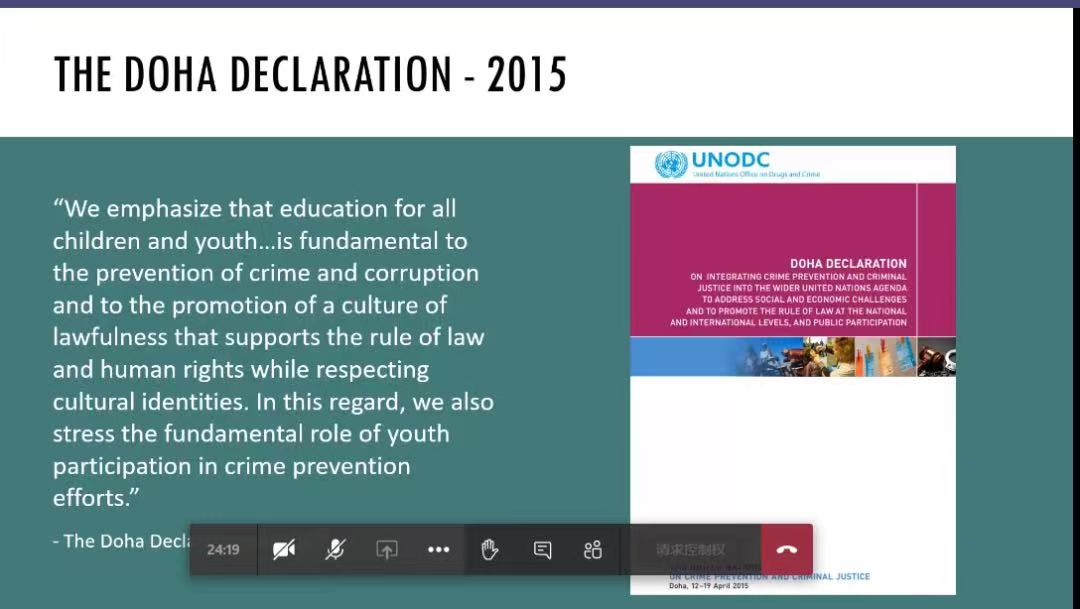
Ms. Kopp continued to provide a detailed introduction to the E4J project. She covered its implementation approaches, tertiary education module content, innovative models, and some project details.
Approaches and Paths of E4J
At the primary and secondary education levels, E4J collaborates mainly with teachers from member states to disseminate knowledge. For tertiary education, E4J focuses on engaging with experts and scholars to explore effective implementation of these activities in universities. Ultimately, E4J has developed three main measures to assist university teachers in delivering relevant courses:
l Collaborating with experts in the field to peer-review and develop a complete set of “E4J Tertiary Education Modules” teaching materials for use by university teachers.
l Organizing training programs for university teachers on topics related to SDG 16 and legal knowledge, providing them with a platform for exchange to address difficulties and challenges encountered in training and teaching processes.
l Collaborating with scholars from different countries, hosting academic conferences, and listening to voices from experts in various fields, providing funding support to young academics for research and innovation in the area of crime prevention and criminal justice.
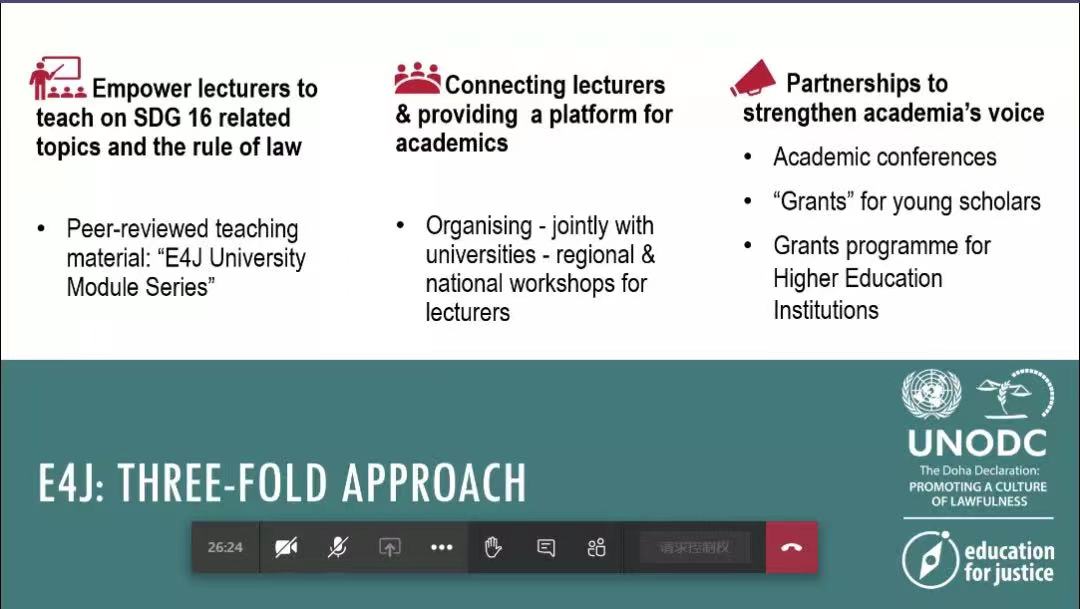
Tertiary Education Modules
The “E4J Tertiary Education Modules” aim to support tertiary level educators and academics in their efforts to transmit knowledge and create a deeper understanding of issues related to rule of law. The focus is on the subject areas such as crime prevention and criminal justice, anti-corruption, organized crime, trafficking in persons and smuggling of migrants, firearms, cybercrime, wildlife crime, counter-terrorism as well as integrity and ethics. More than 600 academics and national experts from more than 550 universities and 114 countries contributed to the development of the university module series and participated in related activities. The university modules are designed for use as either stand-alone teaching resources or as a means of enhancing existing courses in criminology, law, political science, international relations, sociology, and many other disciplines. The progress of this module is currently satisfactory. However, Ms. Kopp noted that teachers still need to make appropriate adjustments based on factors such as course structure and student backgrounds to choose topics and methods that are suitable for their students and themselves.
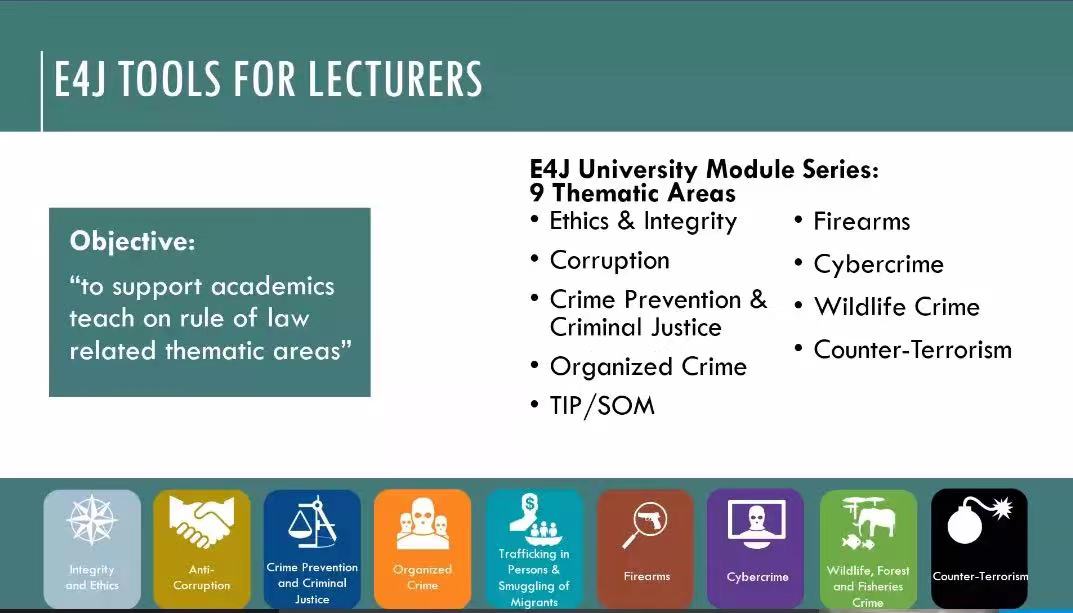
So far, the E4J tertiary education Module has been made available online in the six official languages of the United Nations to ensure accessibility to as many universities and users as possible. However, due to the extensive content of the module, the translation task is enormous. Therefore, UNODC is actively seeking collaboration with universities worldwide to promote the dissemination of educational module’s content and ideas in China.
Innovative Approaches and Selected Projects
During the pandemic, in response to requests from scholars, E4J developed a new content series called the “E4J Global Podcast Series: Voices of Academia”, which goes live every two weeks. It primarily features interviews with scholars from fields including the rule of law, providing learning resources for students and scholars worldwide. UNODC has already established a network of thousands of scholars around the world.
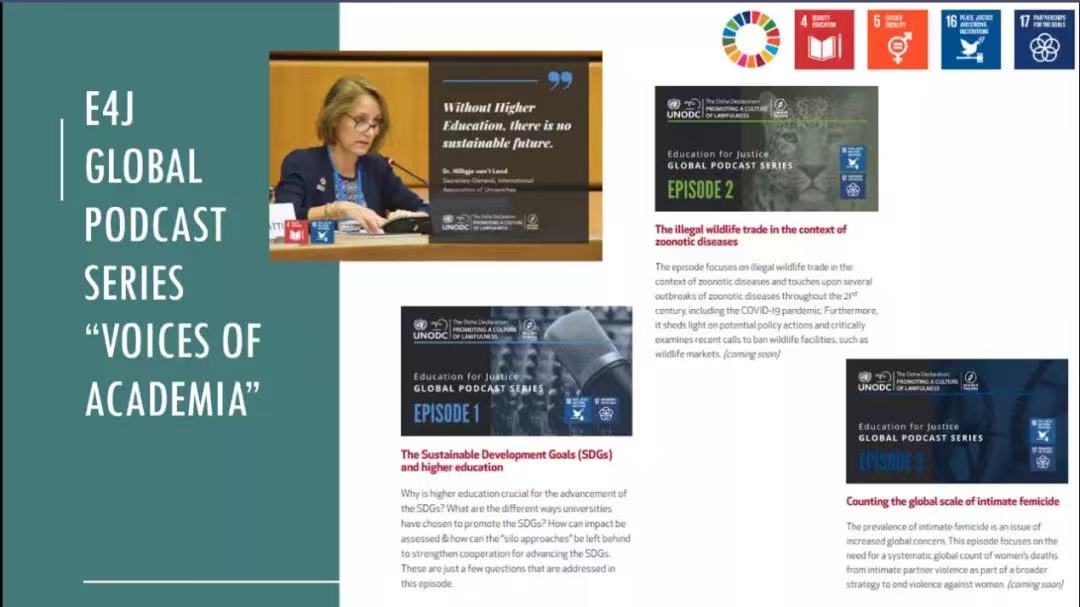
Furthermore, UNODC developed the E4J Grants Programmes, which provide opportunities for young people from all countries to participate in various conferences. Additionally, UNODC actively engages with scholars and policymakers to explore ways to enhance global rule of law through strengthening international cooperation.
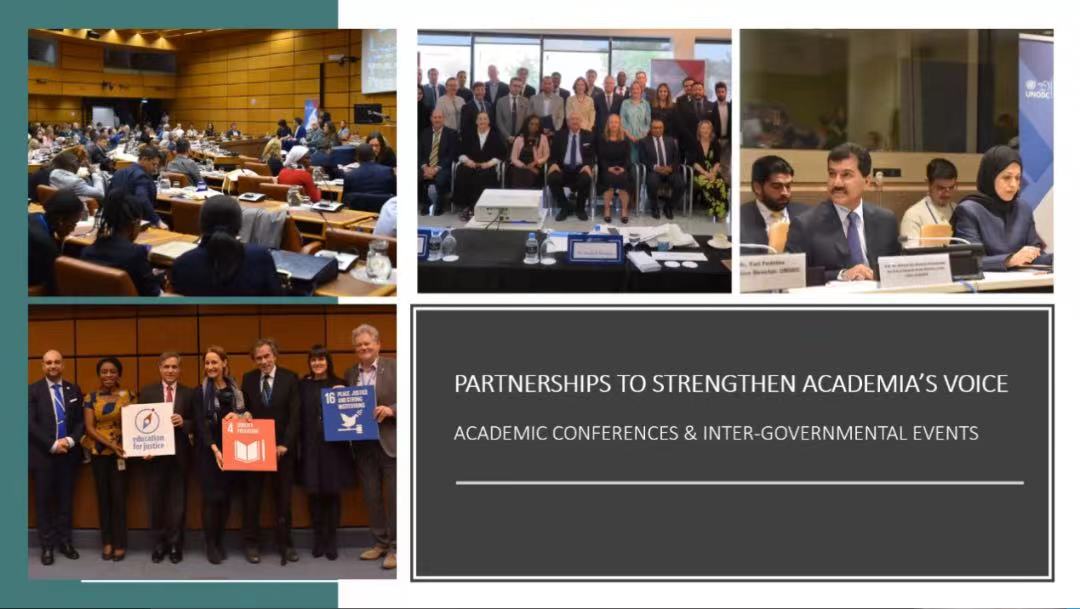
After the introduction, both parties discussed the specific collaboration details regarding the translation of the E4J Tertiary Education Modules. Professor Zhao Longyue, Dean of SIGI, highly values the cooperation with UNODC in this translation project. He considers it not only as a language study exchange but also as a great opportunity for students to gain an in-depth understanding of the United Nations’ daily work and its Sustainable Development Goals. This collaboration holds significant importance in assisting universities in China and relevant scholars in studying United Nations drug and crime issues, promoting crime prevention, and fostering a culture of lawfulness. SIGI will leverage the interdisciplinary backgrounds of its faculty and students to excellently complete this translation project.
At the end of the meeting, Professor Zhao presented SIGI’s model, focus and achievements to Ms. Kopp and Ms. Ehalt. He emphasized that most graduates had successfully secured internships at global international organizations. Ms. Kopp praised and appreciated this success. She expressed her desire for further collaboration with SIGI in various fields, such as collaborative teaching and research projects, to promote SDGs. She also hoped SIGI would provide skilled and versatile talents for international organizations like the United Nations.
